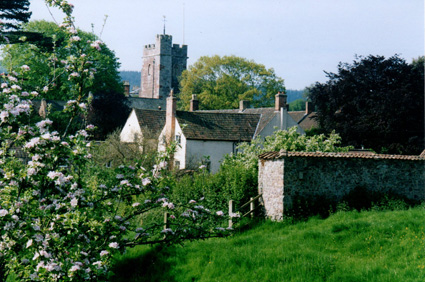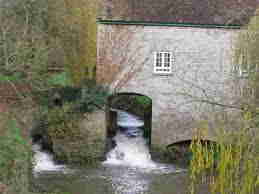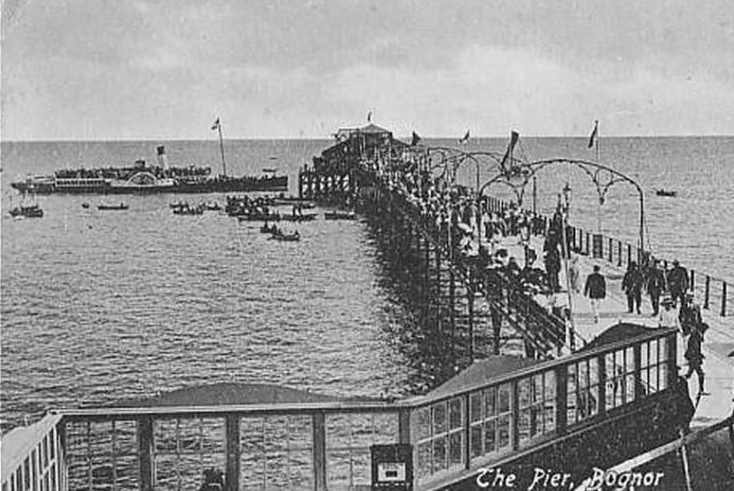|
The
Miller’s Apprentice
My
Father’s Story By
Patricia Stephens My
father, William, was born in Somerset, the eldest of eight brothers, on
a farm with a cider apple orchard. It was a time of great rural hardship
and drudgery, from sun-up to sun-set, with never a penny to spare. The
boys were called on to do a man’s work while they were yet children.
Making delicious cider in the cellar never did pay, and the small mixed
farm hardly turned a profit for a growing family. Then,
at the age of twelve, William was plucked from the village school and
“…sold for a sack of flour” as he said later. Money was owed to
the local miller, who offered to write off the debt if he could have the
eldest son as apprentice”. The deed was done. My father was carried
off, weeping, in the miller’s cart, to a life of lonely brutality,
working under a drunken and sadistic taskmaster. Often
beaten with a studded, buckled belt for the smallest error -or for no
reason at all- he regularly cried himself to sleep on his makeshift
bed of flour sacks out in the draughty barn. “Even
the horses had blankets”, he said bitterly later. “There was never a
blanket for me, or a pillow to lay my head on.”
The
miller’s wife did what she could for him, bringing food and a candle,
but only daring to bring him into the house when she was alone. There he
learned the skills of baking and cake decorating, which later he was
able to use in building up his own business. In due course, with energy
and endurance he created his own small empire. In
the meantime, his health was undermined by the conditions in which he
was compelled to work, His lungs were affected and asthma developed,
from which he suffered for the rest of his life. Without
his family for comfort or support, with only a few books which he could
borrow from the miller’s wife, and reading by candlelight by night,
his amazing spirit kept him living and learning. Es When
he was sixteen, he managed to escape with the help of the miller’s
wife, who bribed a coach-and-horse to take him with them to London. She
tucked food and clothes into a bundle for him, with a pouch of five gold
sovereigns to see him on his way. They both wept bitterly and promised
to keep in touch. Two years later, when he was settled in a good job, he
wrote to her with ten crisp notes inside, but the letter was returned
unopened by the postmaster, who sent a message that she had died soon
after he had left. He could only imagine her lonely death, without him
for company. Ever
more determined to be worthy of her trust and sacrifice for him, he
worked like a beaver in increasingly lucrative and responsible jobs,
saving his money and finally buying out an old boss who had befriended
him and wanted to help him have his own business. By
the time he was twenty one, he had invented his own milk-loaf, calling
it and patenting it as Lacta
and entering it in the Paris Trade Exhibition in 1909. With his prize
money, he bought out a run-down hotel and refurbished it completely, and
very successfully. From
the on his drive and ambition took him onward and upward. He no longer
had to do the heavy manual work, but had the fortunate luck in finding
reliable and honest managers to undertake the work he could no longer
do. My
Father meets my Mother I
discovered much later, when our great-uncle Frank dragged it out of him,
the romantic story of William’s first meeting with my mother. It
was in the Highgate Cemetery, over the grave of his good friend Timothy,
who had nursed another man to full recovery from typhoid fever, only to
succumb to it himself. He has been mother’s young fiancé, engaged for
two years, and hoping shortly to be married. Now,
even in grief, my mother raised her eyes to acknowledge my father as
another mourner, when there was an instant rapport between them. In that
first glance, they saw that they were meant for one another. He
walked her home and soon had her laughing again. He wasted no time
before arranging a wedding date, complete with a cake made and decorated
with his own artistic hands. Soon they were established in a lovely
villa in Sudbury, just outside London, and away from the typhoid
epidemic, which struck down so many families living in overcrowded and
poverty-stricken conditions, lacking good water or hygiene. The
young survivors became aware that life was precious, and meant to be
lived. My parents, in the course of time, must have had a full
“baker’s dozen” of children, and brought up to adult life four
sons and five daughters, some of whom inherited the dreaded asthma. My
mother was a devout Roman Catholic, born in Kilkenny, Ireland, whereas
William was a Protestant Freemason of the Grand Lodge in London – a
Tory down to his socks. They lived a very social high life in London and
were a perfect foil for each other. War- During
the 1914-1918 War, my father was in a syndicate with one of the Rank
brothers (the others went into films) and they had what they termed a
“corner” in wheat and other grain, with storage in warehouses. With
the onset of the Gallipoli Campaign, imports from Russia were closed
down. When the reserves were finally sold, at great profit, fortunes
were made and a hungry nation could eat again. When
I was growing up, interested always in social history, I asked my father
how he came to be involved in what amounted to profiteering in war-time. He
said “It was either that, or go to the wall. I had a growing family
and many others to support. If I hadn’t done it, others would have, so
the end result would be the same”. We
both broke down and cried over it, but in time I have tried to
understand just how difficult it was for him. Always
active in local affairs, at one time he was all set to become the next
Lord Mayor of his region, but his health forced him to retire. He left
the growing pollution of the city and moved his family to the seaside
town of Bognor in Sussex. This was also the choice of the Royal Family
for the convalescence of the King, George
V, after a similar illness. The town was honoured by a royal
charter and thereafter became Bognor Regis.
William
took an interest again in local government, bought a thriving restaurant
and hotel, became a gentleman –farmer, with 32 acres leased from the
Squire of Colworth, near Chichester, and my mother took up chicken
farming. Unfortunately
for me, while I was away at the convent boarding school in which I had
been incarcerated, I was appointed chief egg turner in my mother’s
incubator room. She had four of these monstrous machines, each
containing hundreds of eggs, all of which had to be marked “X” on
one side and “O” on the other. Then they had to be turned carefully
at due times of the day – by hand – one by one. One cannot imagine
the extreme ennui this caused, or the extreme allergy caused by anything
ovoid in the future. But
his is my father’s story. My sufferings may be recorded at another
time. Suffice to say, he pampered her every whim, so that from 60 day
old Black Leghorn chicks, my mother ended up with 600 head of poultry of
various breeds, some of them quite rare – and soon prizes in local
shows. The work was done by all her loyal slaves, as it always had been.
My mother was a great organizer, whether it be for a charity ball in
London, or a local poultry farmer’s gathering, while William smiled
and approved, financing gladly all her extravagant schemes. Disaster
strikes He
always had time for us, stopped to play board games with us after a busy
day, and was immensely proud of our achievements, whether in sport or
music, skating or dancing. He would sit and tend to us when we were
sick, and dab at us with Calamine Lotion when we were spotty with
Chicken Pox or Measles: always cheerful, kind and witty. Generous to a
fault, he helped many young people on their way - and never suspected
that he would be stabbed in the back by some of the same people he had
set up in their own business. Against
all the odds of ill-health and the great economic depression of the
times, he battled on, only to be made to declare bankruptcy when his
investments failed, and those he had helped to finance turned on him
when he needed their support. Suddenly,
it seemed, the house was sold, priceless furniture was auctioned off,
and our cars were taken to a salesroom. We all became used to public
transport for the first time. Those
of us young enough to be still at boarding school did not go back after
the holidays and were taken into the local grammar or elementary
schools, to which we walked every day. I was sixteen going on seventeen,
so I answered an advertisement for a nursery governess in Highgate Hill,
and settled down there to earn a living. My
father never recovered from the shock, and gradually, yet suddenly
seemed to have aged prematurely. He took a menial job as a catering
manager to an organization in Sheffield, but his health was not up to
the work or the climate. My mother was most resolute in her support and
I never heard her utter a word of dismay or discomfort in their
troubles. They came south again to London, where he managed a corner
bakery again, after so many years, a corner bakery with living
accommodation in South Shields. William and Gregory Sage (grandson) about 1942
In
spite of an older brother and I giving all the help we could, that
project failed too, and my father’s will to live snapped. He had a
fatal heart attack and died in Hammersmith Hospital, aged not yet 60. The
Second World War was going on by then and three of my brothers were
serving overseas, so that only a small group of us gathered round his
bedside to say goodbye. I think it nearly broke my mother’s heart that
he could not be buried in the Catholic family plot. He had to be taken
to the Highgate Cemetery, where my mother said she was also to be buried
with him, in the very same grounds where they had first met, so many
years before. Agnes (wife) and John (son and father of Paul) 1947
|


